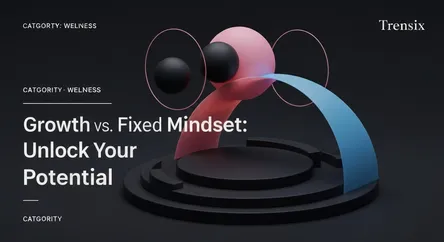Wellness
Growth vs. Fixed Mindset: Unlock Your Potential

Discover the difference between a growth and fixed mindset, a concept by Carol Dweck, and learn how your beliefs about intelligence impact success.
What is it?
A "growth mindset" is the belief that your abilities and intelligence can be developed through dedication and hard work. This contrasts with a "fixed mindset," which is the belief that qualities like intelligence are static traits you're born with and cannot change. The concept was pioneered by Stanford psychologist Carol Dweck. People with a growth mindset embrace challenges, persist through setbacks, and see failure as an opportunity to learn. Conversely, those with a fixed mindset may avoid challenges to prevent failure and feel threatened by the success of others.
Why is it trending?
The mindset concept is popular in education, business, and personal development because it provides a powerful framework for improvement. Research shows a strong link between a growth mindset and greater motivation, resilience, and academic or professional achievement. Companies and schools are adopting this theory to foster innovation and create environments where individuals feel empowered to learn from mistakes. The idea that you can "rewire" your brain through effort and new strategies is highly motivating and supported by the concept of neuroplasticity.
How does it affect people?
Your mindset profoundly impacts how you navigate life. A growth mindset leads to a passion for learning, better coping skills, and higher self-esteem. It allows individuals to thrive in challenging situations by viewing obstacles as puzzles to be solved rather than as proof of their limitations. A fixed mindset can lead to a fear of failure, causing people to avoid risks and potentially miss out on opportunities for growth and success. Ultimately, cultivating a growth mindset can lead to a more successful and less stressful life.